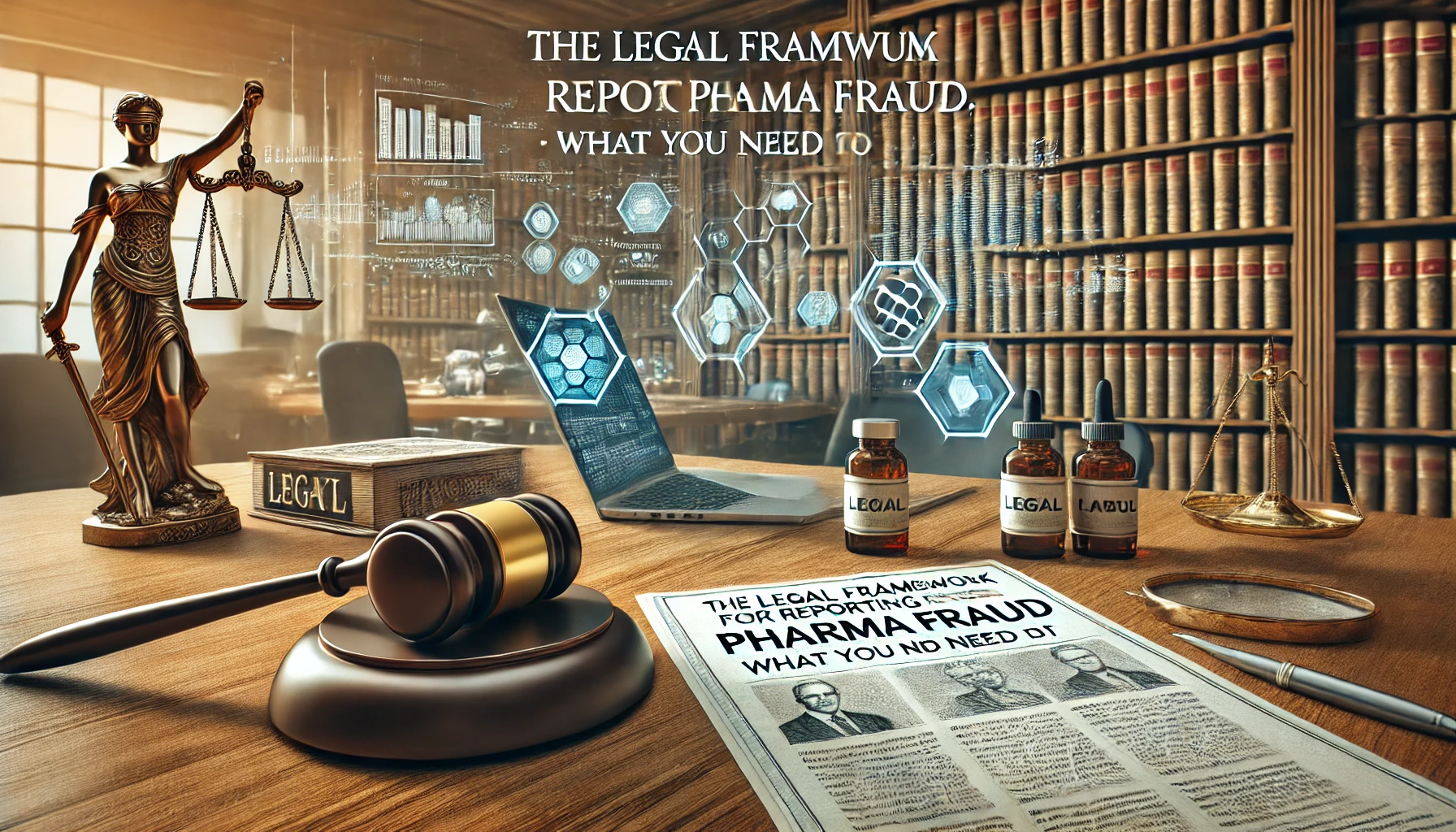Pharma fraud encompasses a range of dishonest practices within the pharmaceutical industry that can adversely affect patients, taxpayers, and the healthcare system. This fraud can take various forms, including misleading marketing, falsified drug information, and illegal kickbacks to healthcare providers. Understanding the legal framework surrounding these issues is crucial for individuals who may witness unethical behavior in their workplaces. Reporting such activities is vital for protecting public health and ensuring accountability within the industry. However, navigating the complex legal landscape can be challenging, as numerous laws and regulations dictate the reporting process. Awareness of these complexities empowers individuals to act decisively against fraud.
As we explore the intricacies of pharma fraud, it’s important to recognize the protections and resources available for whistleblowers. These protections are designed to prevent retaliation and encourage transparency, fostering a culture of integrity in the pharmaceutical sector. This article will discuss the definitions of pharma fraud, key laws governing it, and the specific safeguards for those who report it. Additionally, we will outline the steps involved in effectively reporting pharma fraud, providing a clear roadmap for concerned individuals. With the right knowledge and legal support, whistleblowers can confidently take action to uphold ethical standards. By addressing these critical issues, we can work towards a safer and more transparent healthcare system for all.
Understanding Pharma Fraud
Pharma fraud encompasses various dishonest activities that undermine the integrity of the healthcare system. One common example is false advertising, where pharmaceutical companies make exaggerated claims about the effectiveness of their products. For instance, a drug may be marketed as a miracle cure for a disease, even when there is insufficient scientific evidence to support such claims. This can lead to patients being misled and potentially suffering from adverse effects as they trust in the misleading information.
Another form of pharma fraud is the illegal promotion of off-label drug use. This occurs when a company promotes a medication for conditions not approved by the Food and Drug Administration (FDA). While doctors can prescribe medications for off-label uses, pharmaceutical companies are legally restricted from marketing them that way. When companies engage in such practices, they compromise patient safety and undermine the regulatory system designed to protect consumers.
Recognizing these fraudulent activities is crucial for anyone working in the pharmaceutical sector or related fields. If individuals suspect that their company is engaging in unethical practices, it is important to understand how to address these issues effectively. Consulting a pharma fraud law firm can provide essential guidance, ensuring that individuals are aware of their rights and the steps necessary to address these serious issues. By taking action, whistleblowers can contribute to creating a safer and more transparent healthcare system.
Key Laws and Regulations Governing Pharma Fraud
In the United States, several laws and regulations are designed to combat pharma fraud. One of the most significant is the False Claims Act, which allows individuals to file lawsuits on behalf of the government against entities that have defrauded federal programs. This law is particularly important because it empowers whistleblowers to take action, knowing that they can potentially receive a financial reward for their efforts if the case is successful. This provision encourages people to come forward with information about fraud that might otherwise go unreported. Additionally, the False Claims Act includes protections against retaliation, safeguarding whistleblowers from losing their jobs or facing other negative consequences. This creates a safer environment for individuals to disclose fraudulent activities. Understanding the nuances of this act is essential for anyone considering reporting wrongdoing in the pharmaceutical sector.
Another important regulation is the Anti-Kickback Statute, which makes it illegal for pharmaceutical companies to offer or receive payments for referrals. This law aims to eliminate the unethical practice of incentivizing healthcare providers to prescribe specific medications, often at the expense of patient care. When companies violate this law, they not only put their profits ahead of patient welfare but also face serious legal repercussions. Violations can result in hefty fines and even criminal charges, reinforcing the need for compliance within the industry. Furthermore, the Anti-Kickback Statute serves to protect the integrity of medical decision-making, ensuring that prescriptions are based on patient needs rather than financial incentives. Legal counsel can help individuals navigate these regulations, providing clarity on what constitutes a violation and how to address it effectively.
Additionally, the Food, Drug, and Cosmetic Act (FDCA) provides a framework for regulating pharmaceutical products. This law requires companies to submit evidence of a drug’s safety and effectiveness before it can be marketed to the public. When companies engage in deceptive practices, they not only violate the FDCA but also undermine the trust that the public places in the healthcare system. The FDCA also empowers regulatory bodies like the FDA to take action against non-compliant firms, reinforcing the importance of adherence to established guidelines. Violations of this act can lead to product recalls, fines, and a loss of market access, further incentivizing compliance. Legal experts can help individuals comprehend the implications of these regulations and how they can leverage them when reporting suspicious activities.
The Role of Whistleblower Protections in Pharma Fraud Cases
Whistleblower protections are vital in encouraging individuals to come forward with information about pharma fraud. Federal and state laws offer safeguards to ensure that whistleblowers are not subjected to retaliation from their employers. These protections include confidentiality agreements and provisions against dismissal or demotion as a result of reporting fraud. For many individuals, the fear of losing their job or facing harassment can deter them from taking action. However, understanding these protections can empower potential whistleblowers to act without fear of retribution. Increased awareness of these laws can create a culture that values transparency and ethical behavior in the pharmaceutical industry.
A whistleblower law firm specializes in supporting individuals who report fraud and unethical practices. These firms provide essential guidance throughout the reporting process, ensuring that whistleblowers understand their rights and the protections available to them. They can also help gather evidence, file necessary paperwork, and represent clients in any legal proceedings that may arise. By having legal support, whistleblowers can navigate the complexities of their situations with greater confidence. Furthermore, these firms often have extensive experience in handling cases related to pharma fraud, which can be crucial in developing a strong legal strategy.
In addition to legal protections, whistleblower programs often provide monetary rewards for individuals who report fraud that leads to successful legal action. This incentive serves not only to compensate whistleblowers for their courage but also to reinforce the importance of speaking out against unethical practices. With the support of the aforementioned law firm, individuals can feel more secure in their decision to report pharma fraud, knowing that they have the backing of experienced legal professionals. Ultimately, these rewards can help cultivate a more honest and accountable corporate environment, where ethical standards are prioritized over profit.
The Process and Legal Guidance of Reporting Pharma Fraud
Reporting pharma fraud can feel overwhelming, but with the right steps, it becomes more manageable. First, it’s essential to gather comprehensive evidence, such as documents and communications that highlight fraudulent behavior. This documentation forms the backbone of a strong case, ensuring the report is taken seriously. Additionally, maintaining a detailed log of interactions related to the fraud can further support the claim. Once sufficient evidence is compiled, it’s beneficial to review it with trusted colleagues to gain additional perspectives.
Next, individuals can move forward with filing their report, often through a whistleblower complaint that details the evidence and explains the illegality of the actions. This complaint should be as thorough as possible to avoid any unnecessary delays in the investigation process. The process may vary depending on the agency involved, but legal representation can streamline this experience, allowing individuals to focus on their roles while the firm manages the complexities. A specialized law firm ensures that all necessary information is presented clearly, enhancing the likelihood of a successful investigation. Furthermore, they can prepare individuals for potential follow-up inquiries and provide strategies for dealing with any obstacles that arise during the reporting process.
Finally, after moving forward to report pharma fraud, individuals may encounter challenges, such as pushback from employers or requests for additional evidence. In these instances, having a legal team provides ongoing support and reassurance, helping manage communications with relevant agencies. This collaboration is critical, as it keeps whistleblowers informed about the status of their case and any developments. Moreover, the legal team can assist in navigating workplace dynamics that may arise post-reporting, ensuring individuals feel safe and protected. Ultimately, this partnership fosters a culture of accountability in the pharmaceutical industry, ultimately protecting public health and ensuring that patients receive safe and effective treatments.
Final Thoughts
The legal framework for reporting pharma fraud is intentionally structured to empower whistleblowers and promote ethical practices within the pharmaceutical industry. With a solid understanding of laws such as the False Claims Act and the Anti-Kickback Statute, individuals are equipped to take informed steps toward reporting fraudulent activities. The support of a pharma fraud law firm is invaluable in this process, as they provide essential legal guidance and resources to help navigate the complexities involved. By collaborating with experienced legal professionals, whistleblowers can feel more secure in their actions, knowing that their rights are protected and that they have the necessary support to pursue justice.
Ultimately, the journey to expose fraud may present challenges, but the potential benefits are profound. Reporting pharma fraud not only protects individual patients but also contributes to a more ethical healthcare system as a whole. Whistleblowers play a critical role in this process, and their courage can inspire others to take a stand against unethical practices. By fostering an environment where transparency and accountability thrive, we can work together to ensure that the pharmaceutical industry prioritizes patient safety and public trust. The collective efforts of informed individuals and dedicated legal teams can create a safer, more transparent healthcare landscape for everyone.
Explore the Legal Service realm with The Expert Law. Visit our website for limitless inspiration!





